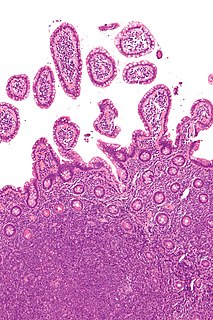
Non-Hodgkin lymphoma (NHL) is a group of blood cancers that includes all types of lymphomas except Hodgkin lymphomas. Symptoms include enlarged lymph nodes, fever, night sweats, weight loss and tiredness. Other symptoms may include bone pain, chest pain or itchiness. Some forms are slow-growing, while others are fast-growing.

The Internet Assigned Numbers Authority (IANA) is a standards organization that oversees global IP address allocation, autonomous system number allocation, root zone management in the Domain Name System (DNS), media types, and other Internet Protocol-related symbols and Internet numbers.
A cancer registry is a systematic collection of data about cancer and tumor diseases. The data are collected by Cancer Registrars. Cancer Registrars capture a complete summary of patient history, diagnosis, treatment, and status for every cancer patient in the United States, and other countries.
Public health surveillance is, according to the World Health Organization (WHO), "the continuous, systematic collection, analysis and interpretation of health-related data needed for the planning, implementation, and evaluation of public health practice." Public health surveillance may be used to track emerging health-related issues at an early stage and find active solutions in a timely manner. Surveillance systems are generally called upon to provide information regarding when and where health problems are occurring and who is affected.
The American Joint Committee on Cancer (AJCC) is an organization best known for defining and popularizing cancer staging standards, officially the AJCC staging system.

The Norwegian Institute of Public Health (NIPH) is a Norwegian government agency and research institute, and is Norway's national public health institute. It is subordinate to the Ministry of Health and Care Services. NIPH acts as a national competence institution in public health in a broad sense for governmental authorities, the health service, the judiciary, prosecuting authorities, politicians, the media and the general public, international organisations and foreign governments. The institute has around 1400 employees.
Charles F. Lynch is a cancer researcher, whose work has been cited 30,000 times. He is a university professor at the University of Iowa. He is director of two large multi-decade studies.
Resource Description and Access (RDA) is a standard for descriptive cataloging initially released in June 2010, providing instructions and guidelines on formulating bibliographic data. Intended for use by libraries and other cultural organizations such as museums and archives, RDA is the successor to Anglo-American Cataloguing Rules, Second Edition (AACR2).
Workplace health surveillance or occupational health surveillance (U.S.) is the ongoing systematic collection, analysis, and dissemination of exposure and health data on groups of workers. The Joint ILO/WHO Committee on Occupational Health at its 12th Session in 1995 defined an occupational health surveillance system as "a system which includes a functional capacity for data collection, analysis and dissemination linked to occupational health programmes".
Disease or patient registries are collections of secondary data related to patients with a specific diagnosis, condition, or procedure, and they play an important role in post marketing surveillance of pharmaceuticals. Registries are different from indexes in that they contain more extensive data.

The Surveillance, Epidemiology, and End Results (SEER) program of the National Cancer Institute (NCI) is a source of epidemiologic information on the incidence and survival rates of cancer in the United States.

The Middle East Cancer Consortium (MECC) is a regional initiative for cancer research and treatment. Established in 1996, MECC members include the United States, Cyprus, Egypt, Israel, Jordan, the Palestinian Authority, and Turkey. MECC aims to reduce the incidence and impact of cancer in the Middle East region through the solicitation and support of collaborative research and regional education. Its motto is: "Respect all people, collaborate in fighting human suffering, and help build a bridge for better understanding among all."
The National Cancer Registrars Association (NCRA), formerly National Tumor Registrars Association, is a not-for-profit association representing cancer registry professionals and Certified Tumor Registrar (CTR) certificants. NCRA's primary focus is education and certification. Worldwide, there are over 5,800 NCRA members and nearly 4,500 CTRs. NCRA provides ongoing training through various mediums including annual conferences, workshops, publications, and their continuing education credit program. NCRA's current advocacy and outreach efforts is the application for a change in the Standard Occupational Classification to the Office of Management and Budget. NCRA is a partner of the Centers for Disease Control and Prevention's National Program of Cancer Registries.

The epidemiology of cancer is the study of the factors affecting cancer, as a way to infer possible trends and causes. The study of cancer epidemiology uses epidemiological methods to find the cause of cancer and to identify and develop improved treatments.

Worldwide, breast cancer is the most common invasive cancer in women. Breast cancer comprises 22.9% of invasive cancers in women and 16% of all female cancers.

Christopher G. Chute is a Bloomberg Distinguished Professor at Johns Hopkins University, physician-scientist and biomedical informatician known for biomedical terminologies and health information technology (IT) standards. He chairs the World Health Organization Revision Steering Group for the revision of the International Classification of Diseases (ICD-11).

Franklin Marshall Matthews White is a Canadian public health scientist focused on capacity building for international and global education, research and development. He advocates:
"Public health...must not be left to the international community to define; it is...the responsibility of the countries themselves to define their priorities. The global agenda should be viewed as complementary at best."
"Health is mostly made in homes, communities and workplaces and only a minority of ill health can be repaired in clinics and hospitals."
"Nations (must) assess their public health human resource needs and develop their ability to deliver this capacity, and not depend on other countries to supply it."
“Public health and primary health care are the cornerstones of sustainable health systems, and this should be reflected in the health policies and professional education systems of all nations.”
Elizabeth M. Ward is an American scientist and researcher for the American Cancer Society. She received her PhD in Epidemiology from the University of Pennsylvania. Ward serves as the National Vice President of Intramural Research for the American Cancer Society and Chair of the World Trade Center Health Program Scientific and Technical Advisory Committee. She has held many positions in various cancer research organizations including a position on the National Cancer Institute's Board of Scientific Counselors for Clinical Sciences and Epidemiology. In recognition for her prominent work in the medical research field, she has received two different awards: U.S. Public Health Service Meritorious Service Medal and the Calum S. Muir Memorial Award. Ward's work is heavily centered around "cancer disparities, cancer treatment and outcomes, cancer surveillance, Occupational cancer and environmental cancer."

Calvin Zippin is a cancer epidemiologist and biostatistician, and Professor Emeritus in the Department of Epidemiology and Biostatistics at the University of California School of Medicine in San Francisco (UCSF). He is a Fellow of the American Statistical Association, the American College of Epidemiology and the Royal Statistical Society of Great Britain. His doctoral thesis was the basis for the Zippin Estimator, a procedure for estimating wildlife populations using data from trapping experiments. He was a principal investigator in the Surveillance, Epidemiology, and End Results (SEER) program of the National Cancer Institute (NCI) which assesses the magnitude and nature of the cancer problem in the United States. In 1961, he created training programs for cancer registry personnel, which he conducted nationally and internationally. He carried out research on the epidemiology and rules for staging of various cancers. He received a Lifetime Achievement and Leadership Award from the NCI in 2003.









